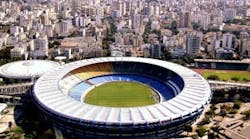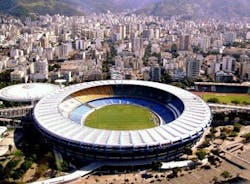ABB to Power Up Brazil's Soccer World Cup Stadium with Indoor Transmission Substation
ABB won an order worth $30 million from Furnas Centrais Elétricas S.A. to construct a new indoor transmission substation in downtown Rio de Janeiro to power the renowned Maracanã soccer stadium and the adjacent neighborhood.
Brazil is boosting its power capacity and enhancing its transmission and distribution infrastructure to ensure that its electricity grid can meet the needs of its expanding economy as well as the 2014 FIFA World Cup and the 2016 Olympic Games. These sporting events are likely to place huge additional demands on the grid as hundreds of thousands of fans and visitors descend on the 12 host cities.
"These compact substations will enable additional power supplies required during the forthcoming global sporting events being hosted by Brazil and will reinforce the transmission grid for the future," said Brice Koch, head of ABB's Power Systems division. "ABB has the range of technologies, the experience and the project management capabilities to support the country in its efforts to strengthen its power infrastructure."
ABB is to design, supply, install and commission a new indoor substation to replace a 40-year-old installation in Grajau, near the Maracanã stadium. Thanks to the compact footprint of the gas-insulated switchgear (GIS), the new higher-capacity facility can be built on the same plot of land as the existing substation.
At 63 kilo-amperes, the substation will have the highest short-circuit current interruption level of any GIS substation in Brazil. This rating refers to the maximum current that a circuit breaker is capable of interrupting to isolate a fault and protect the network. ABB will also install IEC-61850 substation automation, control and protection systems to enable local as well as remote control and monitoring.
The Maracanã stadium was the world's largest when originally inaugurated in 1950, with space for around 200,000 spectators. It has been completely rebuilt for the forthcoming World Cup and, with a capacity of more than 75,000 people, is still the largest stadium in Brazil. It will host seven games in 2014 including the World Cup final.





